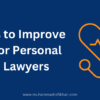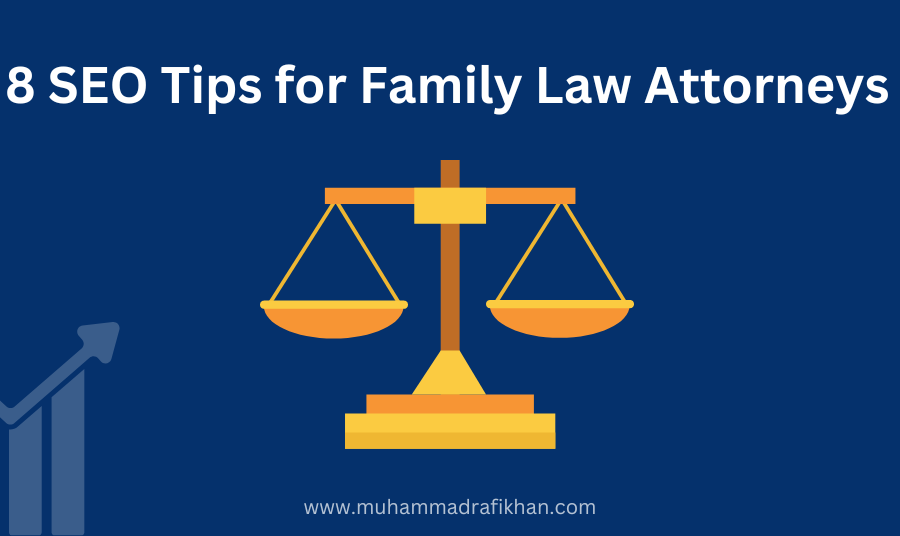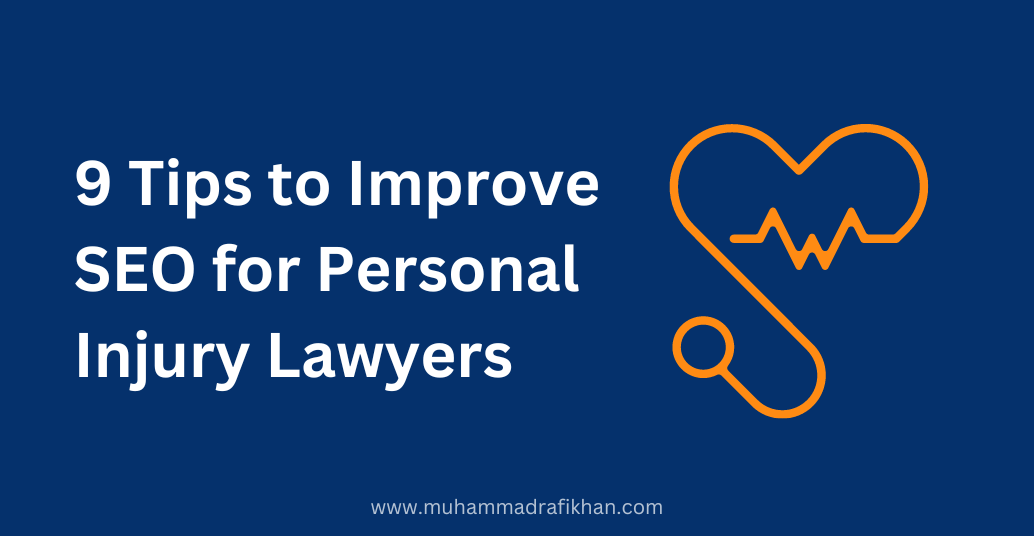
In today’s digital age, search engine optimization (SEO) has become an essential strategy for businesses across various industries. Personal injury law firms, in particular, can greatly benefit from effective SEO techniques to increase their online visibility, attract more potential clients, and ultimately grow their business. This blog will provide you with 12 powerful tips to improve SEO specifically for personal injury law practices, ensuring your firm stands out from the competition and reaches the right audience.
1. Conduct Thorough Keyword Research
Keywords play a vital role in SEO, as they are the words and phrases that potential clients are likely to use when searching for personal injury services online. Begin by focusing on the primary keyword “SEO for personal injury” and conduct comprehensive keyword research to identify other relevant terms such as “personal injury lawyer,” “car accident attorney,” or “medical malpractice law firm.” Incorporate these keywords naturally throughout your website content to optimize your visibility on search engine result pages (SERPs).
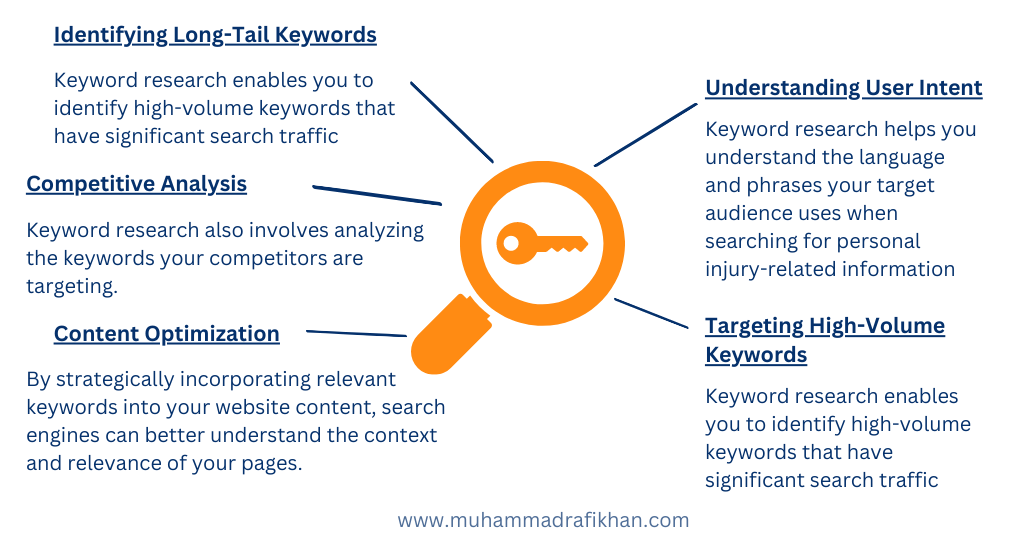
Here’s how keyword research can help improve SEO for personal injury:
Understanding User Intent
Keyword research helps you understand the language and phrases your target audience uses when searching for personal injury-related information. By aligning your content with user intent, you can create relevant and valuable content that answers their questions and addresses their needs.
Targeting High-Volume Keywords
Keyword research enables you to identify high-volume keywords that have significant search traffic. By optimizing your website and creating content around these keywords, you can increase your chances of ranking higher in SERPs and attracting more organic traffic to your site.
Identifying Long-Tail Keywords
Long-tail keywords are more specific and longer keyword phrases that have lower search volume but are highly relevant to your niche. They often indicate higher user intent and can bring in more targeted traffic. By incorporating long-tail keywords into your content, you can attract users who are specifically looking for personal injury services or information.
Competitive Analysis
Keyword research also involves analyzing the keywords your competitors are targeting. By understanding which keywords they rank for, you can identify opportunities to optimize your content or find untapped keyword niches. This information can help you develop a strategy to outperform your competition and gain a competitive edge in the personal injury market.
Content Optimization
Keyword research informs your content creation and optimization efforts. By strategically incorporating relevant keywords into your website content, meta tags, headings, and URLs, search engines can better understand the context and relevance of your pages. This can improve your chances of ranking higher in SERPs for those keywords and drive more organic traffic to your site.
Remember that keyword research is an ongoing process. Regularly review and update your keyword strategy to stay aligned with search trends, evolving user behavior, and changes in the personal injury market.
2. Optimize Your Website’s On-Page Elements
Optimizing your website’s on-page elements can significantly help improve SEO for personal injury websites. Here are some ways in which you can optimize your website’s on-page elements to enhance its search engine visibility:
Title Tags
Craft compelling and keyword-rich title tags for each page of your website. Include relevant keywords near the beginning of the title tag, keep it concise (around 50-60 characters), and make it enticing for users to click on in search results.
Meta Descriptions
Write unique meta descriptions for each page, summarizing the content and including relevant keywords. Although meta descriptions don’t directly impact search rankings, they can influence click-through rates and user engagement.
Heading Tags
Structure your content with proper heading tags (H1, H2, H3, etc.) to improve readability and help search engines understand the hierarchy of information on your page. Incorporate relevant keywords in your headings where appropriate.
Content Optimization
Create high-quality, informative, and engaging content that addresses the needs and queries of your target audience. Include relevant keywords naturally within the content, but avoid keyword stuffing. Aim for a good balance between user-friendly content and optimization.
URL Structure
Ensure your website’s URLs are clean, descriptive, and include relevant keywords when appropriate. Avoid lengthy and confusing URLs that provide little information about the page’s content.
Image Optimization
Optimize images on your website by using descriptive file names and alt tags. This helps search engines understand the visual content and can drive traffic through image search results.
Internal Linking
Utilize internal links to connect relevant pages on your website. This not only helps users navigate your site but also assists search engines in understanding the structure and hierarchy of your content.
Mobile-Friendly Design
Make sure your website is fully responsive and mobile-friendly. With the increasing number of users accessing the internet via mobile devices, having a mobile-friendly website is crucial for SEO.
Page Speed
Optimize your website’s loading speed by compressing images, minifying CSS and JavaScript files, and leveraging caching techniques. Faster-loading pages improve user experience and are favored by search engines.
By implementing these on-page optimization techniques, personal injury websites can improve their search engine rankings, increase organic traffic, and attract more potential clients. Remember, SEO is an ongoing process, so regularly monitoring and updating your website’s on-page elements is important to maintain and enhance your SEO efforts.
3. Create High-Quality, Informative Content
Publishing valuable and informative content is a powerful way to improve your SEO. Develop a blog section on your website and regularly update it with relevant articles addressing various personal injury topics. Write engaging, comprehensive, and well-researched content that answers frequently asked questions, offers legal insights, and demonstrates your expertise. Incorporate your target keywords naturally within the content to enhance its visibility on search engines.
4. Leverage Local SEO
Leveraging local SEO strategies can significantly benefit personal injury lawyers and firms looking to improve their search engine optimization (SEO) efforts. By focusing on local SEO, you can increase your visibility in search engine results pages (SERPs) when users are looking for personal injury services in your specific geographic area. Here are some ways you can utilize local SEO to improve your personal injury SEO:
Claim your Google business profile
Start by claiming and optimizing your GMB listing. Provide accurate and up-to-date information about your practice, such as your address, phone number, website, and business hours. Ensure your listing is categorized correctly as a personal injury lawyer or firm.
Local keyword optimization
Incorporate relevant local keywords throughout your website’s content. Use keywords specific to your location, such as “personal injury lawyer in [city name]” or “auto accident attorney in [city name].” Include these keywords in your page titles, headings, meta descriptions, and within the content itself, while maintaining natural and readable content.
Location-specific landing pages
Create dedicated landing pages that target specific geographic areas you serve. This helps search engines understand your relevance to those locations. Include localized content, testimonials from clients in those areas, and mention local landmarks or neighborhoods to further establish your connection to the community.
Online directories and citations
Ensure your business is listed accurately and consistently across various online directories, such as Yelp, Yellow Pages, and local business directories. Consistent NAP (Name, Address, Phone number) information helps search engines verify your business’s legitimacy and improves your local SEO.
Online reviews and ratings
Encourage your satisfied clients to leave reviews and ratings on platforms like Google, Yelp, and Avvo. Positive reviews can enhance your online reputation, build trust with potential clients, and also contribute to your local SEO efforts.
Local content creation
Produce high-quality, informative content that is relevant to your local audience. Write blog posts, articles, or create videos that address common personal injury concerns or local legal issues. By targeting local keywords within your content, you can attract local visitors and improve your local SEO visibility.
Social media and community engagement
Engage with your local community on social media platforms. Share helpful information, news updates, and community events. Engaging with local organizations, charities, and influencers can help establish your credibility and increase your visibility in the local community.
Remember, local SEO takes time and consistent effort to yield results. Regularly monitor your local SEO performance using analytics tools to track website traffic, keyword rankings, and user engagement. Continuously refine your strategy based on the data to maximize your local SEO impact and improve your online visibility for personal injury-related searches in your area.
5. Mobile Optimization
With the increasing use of smartphones, having a mobile-friendly website is essential for SEO. Ensure your website is responsive and offers a seamless user experience on all devices. Google prioritizes mobile-friendly websites in its search results, so optimizing for mobile will improve your chances of ranking higher.
6. Improve Website Speed
Page load speed is a critical factor in both user experience and SEO. Optimize your website’s loading time by compressing images, leveraging browser caching, and minimizing unnecessary code. A fast-loading website improves user engagement and reduces bounce rates, signaling search engines that your website provides a positive user experience.
Here’s why improving website speed is an essential for your SEO strategy:
User Experience
Website page speed directly impacts user experience, especially for personal injury websites. Visitors seeking legal representation or information related to personal injury cases are often in distress and need immediate assistance. Slow-loading pages can frustrate users and drive them away, leading to a potential loss of clients.
Conversion Rate Optimization
A fast-loading website is crucial for improving conversion rates. Users are more likely to take action, such as contacting a personal injury lawyer or submitting a consultation form, when they can quickly access the information they need. A slow website can discourage conversions and result in missed opportunities.
Search Engine Ranking
Page speed is an important factor in search engine ranking algorithms. Search engines, like Google, prioritize websites that provide a positive user experience. Faster-loading pages are more likely to rank higher in search results, increasing visibility and organic traffic for personal injury websites.
Bounce Rate Reduction
A slow website often leads to a high bounce rate, meaning users leave the site without interacting with other pages. A high bounce rate indicates that visitors didn’t find what they were looking for or were dissatisfied with their experience. By optimizing page speed, personal injury websites can reduce bounce rates and keep users engaged for longer periods.
Competitive Advantage
In the highly competitive field of personal injury law, having a fast website can give you an edge over competitors. Users are more likely to choose a website that loads quickly, provides relevant information, and offers a smooth browsing experience. By prioritizing page speed, you can differentiate your personal injury website and attract more clients.
Accessibility and Inclusivity
Page speed also plays a role in website accessibility and inclusivity. People with disabilities or slower internet connections may face difficulties accessing content on slow-loading websites. By ensuring fast page speeds, personal injury websites can cater to a broader audience and make their services accessible to everyone.
Brand Reputation
A slow website can damage your brand’s reputation and credibility. Visitors may perceive a slow website as unprofessional, unreliable, or outdated. On the other hand, a fast-loading website creates a positive impression, instilling confidence in potential clients. By prioritizing page speed, personal injury websites can enhance their brand reputation and build trust with their audience.
7. Build High-Quality Backlinks
Building high-quality backlinks can indeed help improve SEO for a personal injury website. Backlinks are links from external websites that point back to your website. They serve as a signal to search engines that your website is reputable and trustworthy, and they can contribute to higher search engine rankings.
Here’s how building high-quality backlinks can benefit your personal injury website’s SEO:
Increased visibility
When you obtain backlinks from authoritative and relevant websites in the personal injury or legal niche, it increases your website’s visibility. These backlinks can drive referral traffic to your site, exposing it to a wider audience and potentially attracting more clients.
Improved search engine rankings
Search engines consider backlinks as a vote of confidence for your website. If reputable websites link to your content, search engines view it as a positive signal and may reward your site with higher rankings in search results. Higher rankings can lead to increased organic traffic and more potential clients.
Enhanced domain authority
Backlinks from authoritative websites can contribute to improving your website’s domain authority. Domain authority is a metric developed by Moz that predicts a website’s ranking potential. A higher domain authority indicates a trustworthy and reputable website, which can positively impact your SEO efforts.
Targeted traffic
Acquiring backlinks from relevant websites in the personal injury or legal field increases the likelihood of attracting targeted traffic. Users who visit your website through these backlinks are more likely to be interested in your services and have a higher chance of converting into clients.
Brand credibility and trust
Backlinks from reputable and trustworthy websites help establish your personal injury website as a credible source of information. When other authoritative sources link to your content, it enhances your brand’s reputation and instills trust in potential clients.
8. Harness the Power of Social Media
Harnessing the power of social media can indeed help improve SEO (Search Engine Optimization) for personal injury-related topics. Here are several ways in which utilizing social media can benefit your SEO efforts:
Increased online visibility
By establishing a strong presence on social media platforms, you can expand your reach and increase the visibility of your personal injury content. This, in turn, can lead to more traffic and potential backlinks to your website, which are important factors in SEO.
Social signals and engagement
Social media platforms generate social signals, such as likes, shares, comments, and follows. Search engines consider these signals as indicators of user engagement and quality content. When your personal injury content receives positive engagement on social media, it can contribute to improved SEO rankings.
Content promotion and amplification
Social media provides a convenient and effective way to promote and amplify your personal injury content. By sharing your blog posts, articles, infographics, videos, and other valuable content on social platforms, you can attract more attention and drive traffic back to your website. This increased traffic can positively impact your SEO performance.
Building relationships and networking
Social media allows you to connect and engage with your target audience, industry influencers, and other relevant individuals or organizations. By establishing relationships and networking on social platforms, you can increase the chances of earning backlinks, guest posting opportunities, and collaborations, all of which can contribute to improved SEO.
Brand reputation management
Social media plays a crucial role in managing and enhancing your brand reputation. By actively engaging with your audience, addressing their concerns, and providing helpful information, you can build trust and credibility. Positive sentiment and mentions on social media can indirectly impact your SEO performance, as search engines value reputable brands.
9. Optimize for Voice Search
Optimizing for voice search can indeed help improve SEO for personal injury-related topics. Voice search is becoming increasingly popular, with the rise of virtual assistants and smart speakers. Here are some ways optimizing for voice search can benefit your personal injury SEO:
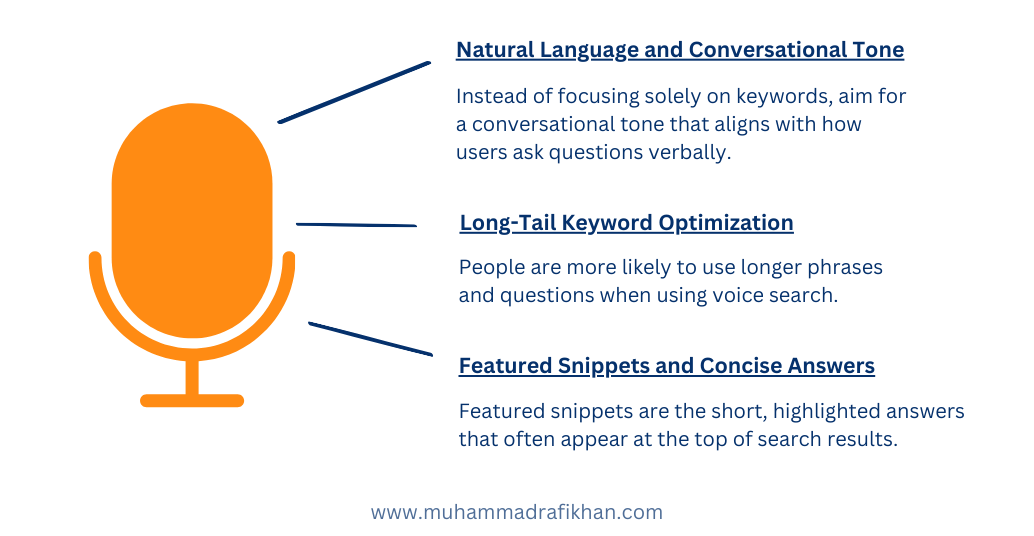
Long-tail keyword optimization
Voice searches tend to be more conversational and use natural language compared to typed searches. People are more likely to use longer phrases and questions when using voice search. By identifying and incorporating relevant long-tail keywords into your content, you can increase the chances of your website appearing in voice search results.
For example, instead of targeting a short keyword like “personal injury lawyer,” you might optimize for a longer, more conversational query like “Who is the best personal injury lawyer in [your location]?”
Natural language and conversational tone
When optimizing for voice search, it’s crucial to create content that mirrors the way people speak. Instead of focusing solely on keywords, aim for a conversational tone that aligns with how users ask questions verbally. This can help search engines understand and interpret your content more effectively.
Featured snippets and concise answers
Voice search queries often seek quick and direct answers. By structuring your content to provide concise and informative answers to commonly asked questions in your personal injury niche, you increase the chances of appearing in featured snippets. Featured snippets are the short, highlighted answers that often appear at the top of search results, making them more likely to be read aloud by virtual assistants.
Conclusion
Implementing these 9 powerful tips to improve SEO for personal injury law firms will undoubtedly enhance your online visibility, attract more potential clients, and position your firm as a trusted authority in the field. By focusing on keyword research, on-page optimization, content creation, local SEO, mobile optimization, and other strategies, you can drive targeted organic traffic to your website and ultimately grow your personal injury practice in the digital realm. Stay consistent, analyze your efforts, and adapt to the ever-changing SEO landscape to achieve long-term success.


![9 Tips to Improve SEO for Personal Injury Lawyers [2023]](https://muhammadrafikhan.com/wp-content/uploads/2023/04/Banner-image.png)


![DoFollow vs. NoFollow Links: Simple & Easy Guide [2023]](https://muhammadrafikhan.com/wp-content/uploads/2023/09/DoFollow-vs.-NoFollow-Links-Simple-Easy-Guide-2023-100x100.png)

